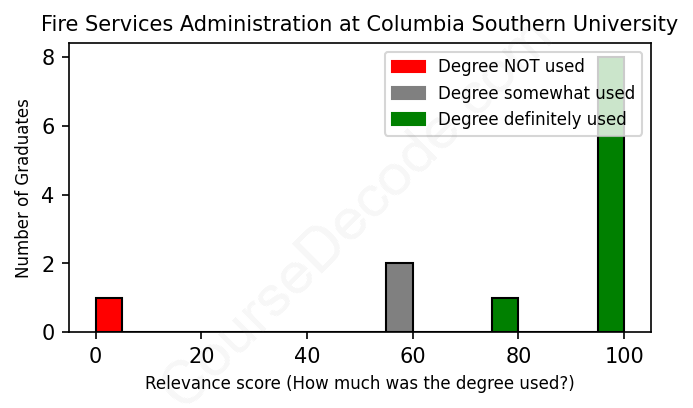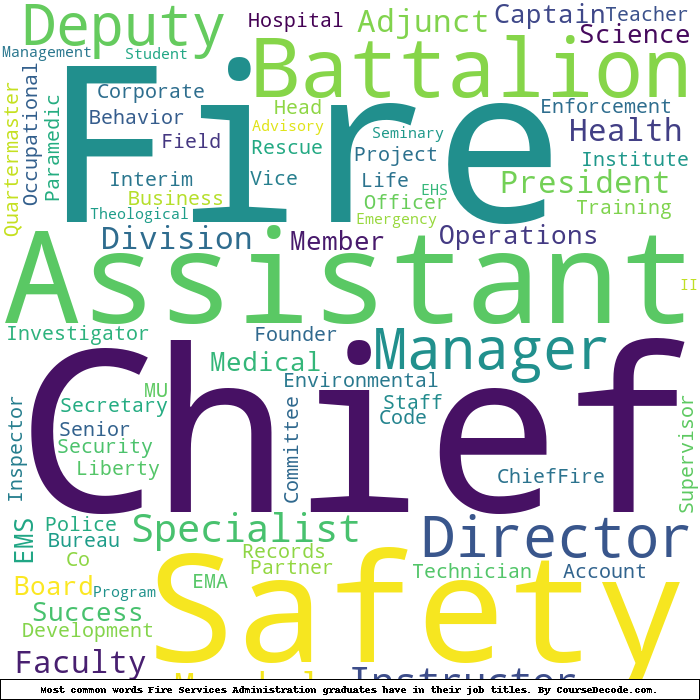
First, some facts. Of the Fire Services Administration graduates from Columbia Southern University we've analyzed , here's how many have used (or NOT used) their degree in their career:

These are estimates based on AI analysis of 12 LinkedIn profiles (see below).
The verdict? Significantly above average. Overall, with an average relevance score of 82%, Fire Services Administration graduates from Columbia Southern University have a much higher likelihood (+15%) of finding work in this field compared to the average graduate across all fields:
And for comparison, here's the chart for all profiles we've looked at across all degrees.
Also, after graduating, only 25% of these graduates have pursued further education other than another Bachelor's degree (such as a Masters degree or other), compared to the average across all profiles of 35%. This suggests a Bachelors degree is enough for most Fire Services Administration graduates, and it's normal to look for work straight after graduation.
See the details:
|
Relevance score: 56% We think this person has gone into a career only somewhat relevant to their degree. We think this person has gone into a career only somewhat relevant to their degree.
DEGREE INFOGraduated in 2014 from Columbia Southern University with a Bachelor of Science (B.S.) in Fire Services Administration. Also pursued further education since (see below). JOB HISTORY SINCE GRADUATIONParamedic / Supervisor / Instructor Allegiance Mobile Health Jul 2016 - Aug 2017 Teacher  Texas Classroom Teachers Association Aug 2017 - Present FURTHER DEGREES DONE SINCE GRADUATINGAlternative Teaching CertificationACT San Antonio 2017 - 2017 ABOUTTeacher Health Science Technology / Field Training Officer / Licensed Paramedic / Emergency Services Consultant / AHA and ASHI Instructor |
The top 10 most common jobs done by the graduates we've analyzed (ranked most common to least) are:
The alumni of Columbia Southern University who earned a degree in Fire Services Administration have landed jobs in various fields, but a significant number of them are directly involved in fire services or emergency management roles. Many graduates, like Battalion Chiefs, Captains, and Fire Marshals, work in positions that leverage the specialized knowledge from their degrees to handle essential duties related to fire safety, emergency response, and management. These roles clearly align with the core competencies developed during their studies, making their career paths quite relevant to their educational backgrounds.
On the flip side, there are graduates who took on positions that don't utilize their fire services expertise as effectively. Examples include those in business management, teaching, or administrative roles within unrelated sectors. While some jobs do incorporate safety elements or emergency preparedness, they often lack the direct application of the skills obtained through a Fire Services Administration degree. So, in summary, while many graduates are thriving in relevant fire services roles, a portion of them has ventured into fields where their degree might not play a major role in their job functions, showcasing a mixed bag of career paths overall.
Here is a visual representation of the most common words in job titles for Fire Services Administration graduates (this is across all Fire Services Administration graduates we've analyzed, not just those who went to Columbia Southern University):

Looking at the career trajectories of graduates from the Fire Services Administration program at Columbia Southern University, it’s clear that many people have taken solid steps into careers that relate directly to the field. Right after graduation, many of these individuals seem to land positions in emergency services, safety, or education roles. For example, a couple of graduates started off as instructors or held administrative positions in health services, which is pretty typical for someone with a background in fire services. Others quickly moved into more specialized roles, like Battalion Chief or Fire Marshal, indicating that they advanced quickly in their careers.
Fast forward five or ten years after graduation, and these folks appear to have solidified their paths in leadership roles within fire departments and emergency services. Many have advanced to high-ranking positions like Battalion Chief and Division Chief, while others have taken on responsibilities in fire safety and training, showcasing a clear career growth. While there are a few outliers whose jobs seem less directly connected to fire services, like teaching or working in medical assistance, the majority of graduates maintain a trajectory that aligns well with their degree. Overall, it seems like these graduates are doing pretty well and are finding their way into relevant, meaningful careers within the field of fire services and beyond.
Honestly, a Bachelor’s degree in Fire Services Administration, especially at a school like Columbia Southern University, tends to be on the easier side compared to some other college programs. While it still requires dedication and effort—like any degree—you’ll find that a lot of the coursework is designed to be practical and relevant to real-world scenarios. Plus, many students are already working in fire services, which can make the material feel more relatable and manageable. That said, don't let your guard down completely; you’ll still need to put in some time and effort to stay on top of your studies!
Most commonly, in the LinkedIn profiles we've looked at, it takes people 3 years to finish a Bachelor degree in Fire Services Administration.
Looking at these graduates from Columbia Southern University, it seems like many of them have ended up in some solid positions within the fire services and emergency management fields. Titles like 'President,' 'Battalion Chief,' and 'Deputy Fire Chief' typically come with a decent paycheck, so they’re likely making good money, especially with their experience and responsibilities. Some have taken on educational roles, like teaching and instructing, which can also be pretty rewarding financially and personally. Of course, some jobs like the medical assistant or a police records specialist might not pay as much, but overall, it looks like most of these folks have carved out some pretty lucrative careers in their respective fields!
Here is a visual representation of the most common words seen in the "about" section of LinkedIn profiles who have a Bachelor degree in Fire Services Administration (this is across all Fire Services Administration graduates we've analyzed, not just those who went to Columbia Southern University). This may or may not be useful:

Here are all colleges offering a Bachelor degree in Fire Services Administration (ordered by the average relevance score of their Fire Services Administration graduates, best to worst) where we have analyzed at least 10 of their graduates:
| College | Score | Count |
|---|---|---|
 Columbia Southern University Columbia Southern University
|
82 | 12 |